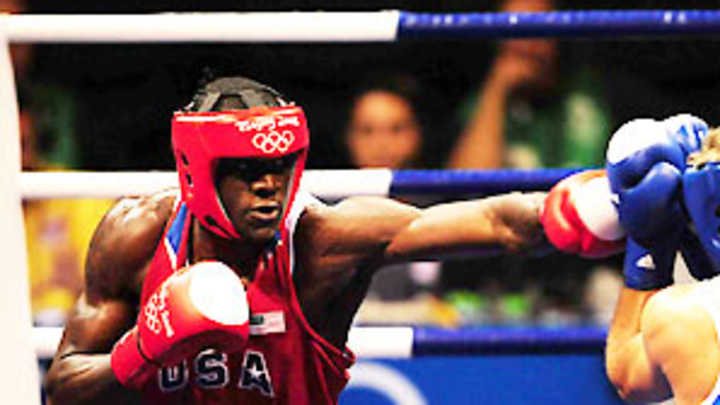Feeling the pressure to go pro

BEIJING -- Pierce Egan, the famed 19th-century boxing journalist who coined the term "sweet science," wrote that "Drummers and boxers, to acquire excellence, must begin young."
It is as if the fates conspired to push 22-year-old Deontay Wilder toward pugilism just to prove Egan wrong. The 6-foot-7 heavyweight, whose bronze medal on Friday kept alive the U.S. streak of winning a boxing medal in every Olympics in which it competed, never meant to be a boxer. Not like his USA Boxing teammates, all of whom were ducking and diving by age 12.
Wilder grew up as a basketball player in Tuscaloosa, Ala. He was in his freshman year playing at Shelton Community College when his girlfriend became pregnant. It wasn't by design. An early ultrasound showed that Wilder's daughter would be born with spina bifida.
"Our hearts dropped," Wilder said. "Doctors gave us the choice to terminate the pregnancy, but after a while I just said, it really doesn't matter, this is my little girl."
Wilder dropped out of school and found work at Red Lobster and driving a Budweiser truck so he could support his daughter and shuttle her to doctors and hospitals to fix her clubbed feet. But there was a hole in his heart where basketball had been, and with team sports out of the question, boxing was something that offered a flexible schedule. Thus, 3-year-old Naieya Wilder helped keep the U.S. medal streak alive by turning her daddy to boxing. "She's healthy and smart," Wilder said, proudly.
For the first time in 20 years, USA Boxing established a residence program and required Olympic boxers to live in Colorado Springs beginning last September, a response to America's dearth of boxing gold in recent Olympics after a gilded history. Wilder, with his coach's blessing, seized the opportunity to "play catch up," he says, with intensive training.
But other team members resented being plucked from their long-time coaches. David Ali, father of 20-year-old lightweight Sadam Ali, who lost his opening bout, said before the Olympics that Sadam "could have gotten better training [at home in New York]. He has two trainers here."
Light welterweight Javier Molina, 18, who lost his first fight at the Olympics, said that the residence program "takes me out of my comfort zone. The only thing I like is I get to know the other Olympians, but I don't know if that'll help me. This isn't like a basketball team." Molina said that while the USA Boxing coaches are very good coaches, Roberto Luna, the man who has coached him since he was eight, "knows my weaknesses."
It didn't help that some of the coaches were loath to part with their prized pupils, and many continued to exert influence from afar by email and phone. Wilder's coach, Jay Deas, bought into the idea that Wilder needed to make up for lost time, and "did not interfere," says USA Boxing coach Dan Campbell. "Other coaches didn't want to cooperate."
In the broader view, though, Egan had a point about experience. This U.S. team was extremely young, with an average age just older than 20, and only one returning Olympian, world champion flyweight Rau'shee Warren, who lost his opening bout.
Wilder could use more amateur bouts to hone his skills, but his punishing power -- in a test prior to the Olympics, his jab measured stronger than all but one other U.S. boxer's power punch -- may ensure this is his last Olympics. Wilder said he's already gotten calls from promoters. In other countries, so-called amateurs enjoy great financial support.
"International boxers, like Cubans, they get paid to stay amateur; we don't get paid to stay," said Ali, the first Olympic team member since Riddick Bowe in 1988 to hail from New York City, where boxing gyms have dwindled from a high of 150 in the mid-1980s to 50. "So we go for it once, and turn pro."
To the detriment of both amateur and professional boxing.
